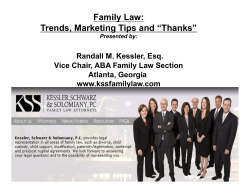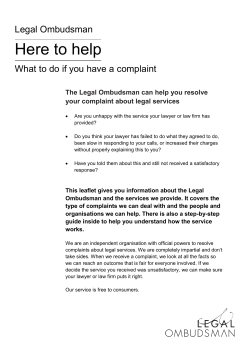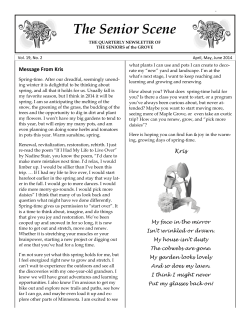
O
LOS ANGELES www.dailyjournal.com TUESDAY, APRIL 30, 2013 When does a demand letter become extortion? By Timothy D. Reuben O ne of the most common tasks lawyers perform is sending demand letters — but as the 2nd District Court of Appeal recently warned: be careful how you do it! In Mendoza v. Hamzeh, 2013 DJDAR 5202 (2013), Justice Victoria Chaney, writing for a unanimous court (Justices Robert Mallano and Jeffrey Johnson concurring), affirmed Los Angeles County Superior Court Judge Mary Ann Murphy in denying an anti-SLAPP motion by a lawyer who was sued for extortion because of his demand letter. Attorney Reed Hamzeh wrote a demand letter on behalf of his client contending that Miguel Mendoza had defrauded his client out of at least $75,000 and went on to threaten that if the money was not returned, Hamzeh would “be forced to proceed with filing a legal action against [Mendoza], as well as reporting him to the California Attorney General, the Los Angeles District Attorney, the Internal Revenue Service regarding tax fraud, the Better Business Bureau , as well as to customers and vendors with whom he may be perpetrating the same fraud upon [sic].” Frankly, this language is not the most aggressive or egregious found in demand letters sent in California legal practice, nor is it clear how Mendoza could possibly have suffered any damages because of it; but Mendoza, likely wanting to get back at the lawyer, sued Hamzeh for extortion. Hamzeh responded with an anti-SLAPP motion — he was engaged in the protected activity of pursuing a claim for his client. However, citing the state Supreme Court’s opinion in Flatley v Mauro, 39 Cal. 4th 299 (2006), the appellate court held: “Regardless of whether the threat in Hamzeh’s demand letter may be characterized as particularly extreme or egregious, it still constitutes criminal extortion as a matter of law.” Nor did it matter that Hamzeh “did not list specific crimes in the demand letter.” Justice Chaney sought to articulate “a bright line rule,” and held that any criminal extortion is not subject to the anti-SLAPP statute because it is simply not protected speech, so the lawyer could be sued for sending a demand letter. In so ruling, Justice Chaney eliminated uncertainty about whether Flatley applies only to extreme or egregious conduct by a lawyer. Flatley does not apply only to some “litigation communications,” but rather it applies to any “litigation communications which constitute extortion as a matter of law.” Interestingly, the trial court even awarded fees against the lawyer for bringing the anti-SLAPP motion — and awarding fees against the moving party is subject to a Section 128.5 standard, meaning the court found the motion was brought in bad faith and frivolous. Such fees against the moving party are not regularly awarded. In upholding the trial court’s discretion, the appellate court noted that Hamzeh had failed to cite Flatley in his motion, implying that failing to do so was indicative of bad faith. This was in spite of Hamzeh’s position that Flatley did not apply. Demand letters are frequently laced with threats as part of lawyers’ efforts to recover funds for their clients. Indeed, often demand letters are written extremely aggressively both to quickly intimidate an opponent into a resolution and to gladden the heart of an angry client who enjoys seeing an adversary threatened and berated. Lawyers often use their demand letters as client relations tools, inspiring confidence by demonstrating to their clients pugnaciousness and allegiance to the clients’ cause. Indeed, certain clients simply love to think they have the toughest lawyer in town. And of course, demand letters are supposed to be threatening. Sadly, this court ruling affirms the problematic notion that if phrased incorrectly, lawyers can be sued for their words. But did Justice Chaney achieve the objective of creating a bright line rule? And what is criminal extortion anyway? Sadly, this court ruling affirms the problematic notion that if phrased incorrectly, lawyers can be sued for their words. As stated in Flatley: “Extortion is the threat to accuse the victim of a crime or ‘expose, or impute to him ... any deformity, disgrace or crime’ (Pen. Code Section 519) accompanied by a demand for payment to prevent the accusation, exposure, or imputation from being made.” This definition is consistent with Rule 5-100(A) of the Rules of Professional Conduct which prohibit lawyers from “threaten[ing] to present criminal, administration, or disciplinary charges to obtain an advantage in a civil dispute.” Justice Chaney explains further: “The threat to report a crime may constitute extortion even if the victim did in fact commit a crime.” The key to all this is that the threat is “coupled with a demand for money.” Simply put, subject to Rule 5-100(A), lawyers can threaten to report crimes in their demand letters as long as they don’t demand money. But if there is a demand for some form of compensation (and there usually is), threatening even generally to report a crime to the authorities is extortion and lawyers can be sued for that. And of course, there will be no possibility for success in an anti-SLAPP motion. But there does seem to be something problematic about this narrowly carved out rule. For example, doesn’t a threat only to file a civil suit potentially expose or impute to the potential defendant some “disgrace”? And what if the civil claim is also arguably a criminal violation and the lawyer cites portions of the penal code or other statutes that also contain potential criminal implications (such as the Copyright Act, securities law, or RICO statutes)? Certainly the government can get hold of a filed complaint that alleges criminal violations — particularly if it is well-publicized. And is the threat of reporting a crime to the authorities the only thing that constitutes extortion, and if so, why, and if not, what else is extortion? Here, Hamzeh also threatened to contact the Better Business Bureau and also customers and vendors — does that constitute extortion since it would be a “disgrace”? And what about such threats in a mediation, which is supposed to be governed by confidentiality statutes? Can a lawyer be liable for making threats to report criminal conduct if the case is not settled while mediating? Ironically, although the law according to Mendoza finds the lawyer is an extortionist for threatening to report a crime coupled with a demand for money, such threats are frequently of no moment, because the various prosecutorial offices frequently ignore reports of financial crimes, likely due to budgetary restraints. In a civil dispute, the government lawyers often leave it to the civil process to sort things out, preferring to concentrate limited resources on, say, bank robbers. Greater harm in business lawsuits often comes through the other kind of threat that Hamzeh made — informing the Better Business Bureau or customers and vendors of fraudulent behavior. And while defamation laws exist to redress false statements, if done in the context of litigation, the litigation privilege will often insulate such conduct, particularly if the “informing” occurs through subpoenas or demand letters. It also is troubling that a lawyer’s words if carelessly phrased can subject the lawyer to a lawsuit from his client’s adversary. And yet it apparently comes down to simply this: do not say in a demand letter that you will report someone to the authorities unless that person pays money. Of course, it is not extortion to demand money and to say that the authorities have in fact been contacted — it is only the threat that is governed by the statute. After all, the First Amendment to the U.S. Constitution protects the right to report crimes. There is currently another case before the appellate court involving some of these questions regarding a well-known entertainment lawyer, Marty Singer, who has a reputation for writing strong demand letters. Apparently he wrote one which resulted in a lawsuit against him, and Singer and his firm have appealed the denial of their anti-SLAPP motion. So perhaps the appellate court will further clarify just what is and what is not extortion and what is protectable. As the Flatley court pointed out: “rude, aggressive, or even belligerent prelitigation negotiations, whether verbal or written, that may include threats to file a lawsuit, report criminal behavior to authorities or publicize allegations of wrongdoing [do not] necessarily constitute extortion.” That is somewhat different from what Justice Chaney, who seeks to draw a bright line rule, found. And in light of the foregoing issues, this critically important matter that impacts lawyer’s conduct regularly is far from clear and needs more than what Mendoza provides. And hopefully, the appellate court will consider the old childhood adage: “Sticks and stones may break your bones, but words will never hurt you.” Lawyers in representing clients certainly should act professionally, but demand letters should not subject lawyers to being sued by a resentful adversary. Timothy D. Reuben is the founding principal of Reuben Raucher & Blum, a litigation boutique. He can be reached at treuben@ rrbattorneys.com. TIMOTHY D. REUBEN Reuben Raucher & Blum Reprinted with permission from the Daily Journal. ©2013 Daily Journal Corporation. All rights reserved. Reprinted by ReprintPros 949-702-5390.
© Copyright 2025





















